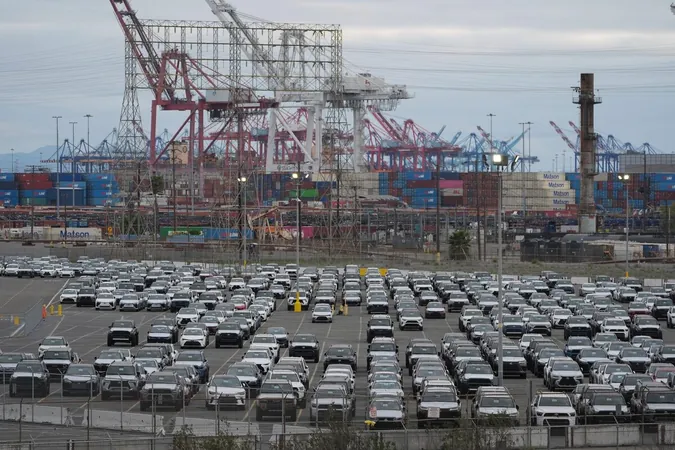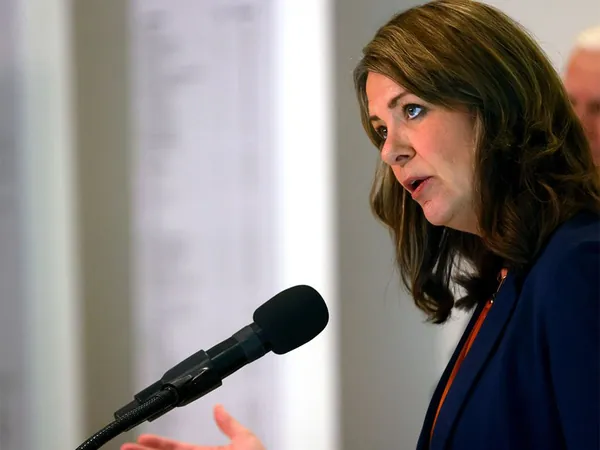
Major Relief on Auto Tariffs Expected for Canada After Key U.S. Call: What You Need to Know
2025-03-27
Author: Charlotte
In a surprising turn of events, Ontario officials are optimistic that the U.S. government will significantly lessen the impact of new auto tariffs on Canada, following a crucial phone call between U.S. Commerce Secretary Howard Lutnick and Ontario Premier Doug Ford.
The communication came just after President Donald Trump's announcement during a press briefing where he proclaimed a new 25% tariff on automobiles based on their non-U.S. content, catching Canadian officials off guard. A senior source from the Ontario government disclosed that Lutnick's interaction with Ford signified an awareness of how closely intertwined the auto supply chains of the U.S. and Canada are, leading to expectations of potential adjustments to the tariffs.
While specifics regarding the expected changes were not shared, there is speculation that these might relate to the calculations of U.S. content in auto parts, potentially giving Canadian and Ontario automakers a significant edge against international competitors. However, this does not imply that the tariffs will be entirely eliminated, but rather refined, ultimately impacting the competitive landscape.
Ford expressed his disappointment in not receiving a heads-up about the tariff imposition, despite previous assurances that he would be informed in advance. “We thought we’d be informed; the word ‘no surprises’ came up in our last meeting. And here we are, surprised,” Ford remarked during a press conference at Queen’s Park shortly after the announcement.
Amidst growing tensions, Ford called for Canadian unity, suggesting a strong approach and the possibility of retaliatory measures against U.S. vehicle imports. However, he was initially hesistant about endorsing a Canadian tariff on U.S. cars, recognizing the economic ramifications it may have for Canadian consumers. “I’ll discuss with Prime Minister Mark Carney and other premiers before making a decision,” he noted, underlining the necessity for a collective response.
Urgently seeking strategy, Ford asked Carney to arrange a meeting with all provincial leaders, ideally by Monday, to ensure a unified national approach to the issue. Additionally, he plans to engage with Canadian auto industry leaders, particularly as Volkswagen prepares to invest significantly in electric vehicle battery manufacturing in Ontario.
The Premier is treading cautiously when discussing any potential reprisal, including resurrecting a 25% surcharge on Ontario's electricity exports to the U.S. He emphasized the importance of evaluating the situation after April 2, highlighting the reality that any retaliatory tariffs would also deter Canadian consumers.
“We have to choose our battles wisely. We can either let this situation run us over, or we can endure some pain and stand our ground. I believe in the latter,” Ford articulated, emphasizing his commitment to fighting back against the U.S. administration.
In a peculiar twist, Ford speculated that the timing of Trump’s tariff announcement might serve as a distraction from a significant scandal brewing in Washington, where controversial conversations over security leak details via a messaging app could be undermining public confidence in the current administration.
As the situation evolves, all eyes will be on the U.S. administration's next steps and how they will affect the delicate trade relationship between Canada and the United States, especially with the upcoming implementation date of the tariffs looming. Stay tuned as this story develops!









 Brasil (PT)
Brasil (PT)
 Canada (EN)
Canada (EN)
 Chile (ES)
Chile (ES)
 Česko (CS)
Česko (CS)
 대한민국 (KO)
대한민국 (KO)
 España (ES)
España (ES)
 France (FR)
France (FR)
 Hong Kong (EN)
Hong Kong (EN)
 Italia (IT)
Italia (IT)
 日本 (JA)
日本 (JA)
 Magyarország (HU)
Magyarország (HU)
 Norge (NO)
Norge (NO)
 Polska (PL)
Polska (PL)
 Schweiz (DE)
Schweiz (DE)
 Singapore (EN)
Singapore (EN)
 Sverige (SV)
Sverige (SV)
 Suomi (FI)
Suomi (FI)
 Türkiye (TR)
Türkiye (TR)
 الإمارات العربية المتحدة (AR)
الإمارات العربية المتحدة (AR)